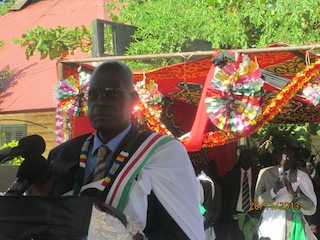Bor MPs say civilians from all tribes are safe to return
February 18, 2014 (JUBA) – Leaders representing Bor constituencies in South Sudan’s parliament have given assurances at a meeting in Juba that officials and civil servants returning to the Jonglei state capital will be safe regardless of their ethnicity.

The fighting began in Juba on December 15 but it soon spread from an conflict between member of the Presidential Guard, with soldiers splitting depending on whether they were loyal to President Salva Kiir or Riek Machar who Kiir sacked last year after almost eight years serving as his deputy.
In the first days of the conflict in Juba, Nuer civilians were targeted by Dinka members of the security services the government has admitted. Reports of the violence triggered army defections in Jonglei, Unity and Upper Nile states, which have significant Nuer and Dinka populations.
Machar his co-accused all deny staging a coup attempt but the former Vice President has since claimed control of the defected soldiers from the South Sudanese army (SPLA) and civilians who are now fighting the government.
The extent of the killing and destruction in Bor, which has changed hands four times but was occupied by the rebels for long periods, has led political and traditional leaders to accusing the defected Nuer soldiers and armed civilians known as the Nuer White Army of repeating the infamous 1991 Bor massacre.
Machar split from the SPLA – who were from 1983 until 2005 fighting the Sudanese government – months before the massacre when forces aligned to him attacked Bor killing at least 2,000 people, according to Amnesty International.
Jonglei state MPs have estimated that over 2,500 people have been killed in Bor during the current crisis.
Since the first days of the conflict Juba has been largely unaffected. South Sudan by the conflict and Jonglei state’s government has established a coordination office. Government employees have been urged to return to work in Bor but many feel that the area is still unsafe due to current communal tensions.
The Dinka and Nuer are the two largest tribes in Jonglei, which the capital Bor traditionally being home to the Dinka. Jonglei’s acting governor John Kong Nyuon is a Nuer.
Deng Dau Deng, a chairman of Bor MPs caucus in Juba told Sudan Tribune on Tuesday that Jonglei state government has raised concern over the safety of non-Dinka staff, fearing reprisals from local people who lost their beloved ones to Machar’s mainly Nuer force.
“Atrocities were committed by [the] White Army” said Deng, adding that accountability and openness is needed to restore relations between the communities.
Despite Presidential order issued late January, 2014 for return of governors of Unity, Upper Nile and Jonglei states to their respective capitals, John Kong has stayed in Juba.
However, governor Kong issued his own order through State Secretary General Arop Leek on February 1, asking government civilians to report to Bor for work within two weeks. Salaries for the month of January are now being received in Bor.
MP Deng said the “people may feel bitter” in Bor working with a Nuer governor, but added that the state’s capital must be home to different tribes.”
(ST)
